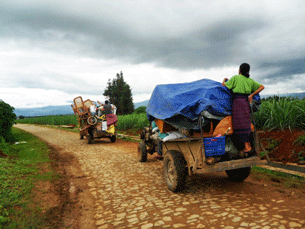Burma: Ethnic groups support ceasefire, dialogue
| Publisher | Radio Free Asia |
| Publication Date | 28 July 2011 |
| Cite as | Radio Free Asia, Burma: Ethnic groups support ceasefire, dialogue, 28 July 2011, available at: https://www.refworld.org/docid/4e49026dc.html [accessed 1 June 2023] |
| Disclaimer | This is not a UNHCR publication. UNHCR is not responsible for, nor does it necessarily endorse, its content. Any views expressed are solely those of the author or publisher and do not necessarily reflect those of UNHCR, the United Nations or its Member States. |
2011-07-28
Armed ethnic insurgents support a call to reconcile with the Burmese army.
 Kachin refugees flee to Burma's border with China to escape the fighting, June 14, 2011. US Campaign for Burma
Kachin refugees flee to Burma's border with China to escape the fighting, June 14, 2011. US Campaign for Burma
Burma's ethnic groups have responded favorably to an open letter from the country's pro-democracy leader asking that armed ethnic insurgents and government troops put down their weapons and begin dialogue after decades of civil war.
Aung San Suu Kyi's letter was issued Thursday and addressed to Burma's ethnic groups and President Thein Sein, leader of the country's new nominally civilian government.
The Nobel laureate warned in the letter that "to use might in solving problems will result in loss for both sides," adding that "national reconciliation cannot be gained by fighting, but only through political negotiations."
Naing Han Thar, leader of the New Mon State Party (NMSP) and secretary of the United Nationals Federal Council (UNFC), said his groups would respect Suu Kyi's wishes.
"We support and welcome it. She has represented all of us [in the letter] and has also made her request from a neutral point of view," he said.
The UNFC is comprised of 11 ethnic groups, including the Mon, Kachin, Karen, and Shan – four ethnic groups that have been involved in some of the heaviest fighting with government troops in the last decades.
The letter was also welcomed by Shan State Army North spokesperson Major Sai La.
"In her open letter to Thein Sein, Daw Aung San Suu Kyi has called for immediate ceasefires and the solving of political problems through political means ... which we support unconditionally," he said.
Recent clashes
The reaction from ethnic armed groups comes as fighting has intensified in Burma's northern and eastern regions in recent months.
The Kachin Independent Army (KIA), based in northern Kachin state, and the Burmese military ended a 17-year ceasefire arrangement on June 9, with each side accusing the other of instigating the fighting.
Some 10,000 Kachin refugees had fled the fighting and attempted to enter China by the end of June, prompting the U.S. State Department to call for a halt to hostilities and an inclusive dialogue between the Burmese government and the country's opposition and ethnic minority groups.
Exiled Burmese media groups have also reported clashes between the Burmese army and the Shan State Army this week.
Separate clashes have also been reported along the eastern border involving the Burmese military, ethnic Mon rebels, and the Karen National Union.
Rights groups have accused the Burmese military of carrying out a brutal counterinsurgency campaign in ethnic minority areas involving the rape, torture, and murder of villagers.
Local reports have said the Kachin refugees were fleeing to escape being preyed upon by government forces, rather than because they feared the fighting itself.
Increasingly vocal
Suu Kyi's letter follows her first talks on Monday with a minister of Burma's new government.
The letter marked the first time she had reached out directly to Thein Sein. Previous communications with Burma's leadership had been issued through her National League for Democracy opposition party.
The daughter of Burmese independence leader General Aung San, Suu Kyi had spent 15 of the last 21 years under house arrest. She was released by the ruling generals on Nov. 13, just after elections which were heavily criticized as a sham by the local opposition and Western powers.
Suu Kyi has since been increasingly vocal, despite pressure from the government to stay out of politics.
Earlier this month she traveled outside of her hometown of Rangoon for the first time since her release from house arrest, prompting an official warning that her trip could lead to "chaos and riots."
She is expected to travel again in August, although the purpose of her trip is unknown.
Reported by RFA's Burmese service. Translated by Nyein Shwe. Written in English by Joshua Lipes.
Link to original story on RFA website
